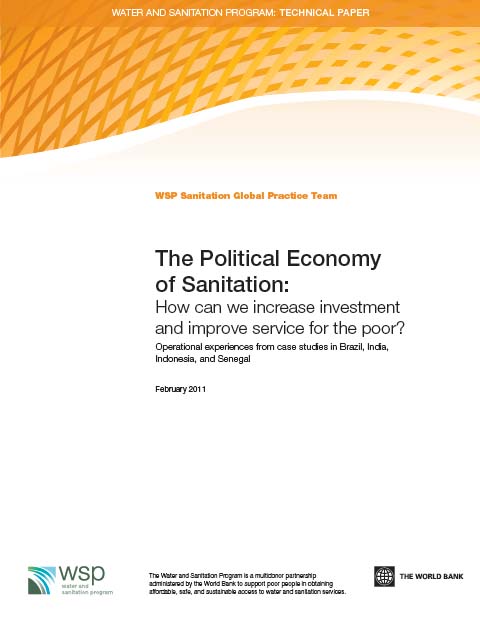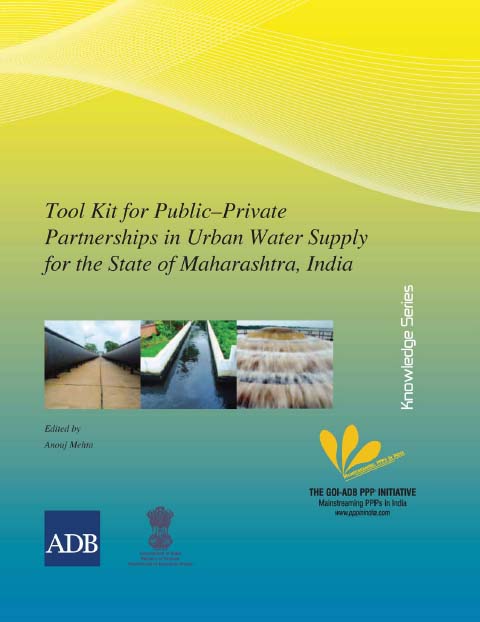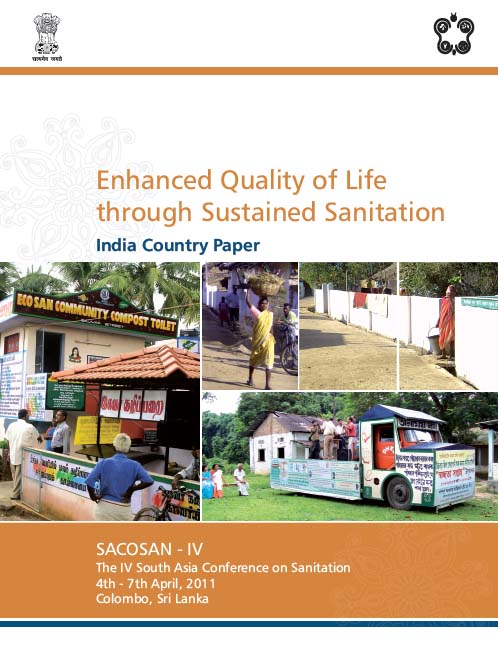/topics/sanitation-and-hygiene
Sanitation and Hygiene
The political economy of sanitation How can we increase investment and improve service for the poor A report by Water and Sanitation Program
Posted on 22 Nov, 2014 10:30 AM This global study attempts systematically to understand and thus help practitioners manage the political economy of pro-poor sanitation investments and service provision.
This global study attempts systematically to understand and thus help practitioners manage the political economy of pro-poor sanitation investments and service provision.
It aims to provide practical advice to multi-lateral agencies and sanitation practitioners to help them better manage stakeholder relations and effectively maneuver within the complex institutional relationships of the sanitation sector in order to enhance the design, implementation, and effectiveness of operations that provide pro-poor sanitation investments and services. The ultimate goal is to improve health and hygiene outcomes.
This study follows current approaches to political economy - interdisciplinary inquiry drawing upon social and political theory and economic principles - to understand how political actors, institutions, and economic processes influence each other. This study’s conceptual framework combines a diagnostic component with a typology of actions to help translate analytical findings into more effective support to operations and investments.
Guidelines of the Central Rural Sanitation Programme and Total Sanitation Campaign by the Department of Drinking Water and Sanitation 2011
Posted on 22 Nov, 2014 10:30 AMThis document by the Department of Drinking Water and Sanitation deals with the guidelines of the Central Rural Sanitation Programme (CRSP) and Total Sanitation Campaign (TSC). India’s first nationwide programme of rural sanitation, the CRSP was launched in 1986, while TSC was launched in 1999 with the aim of ending open defecation.
Public Private Partnerships in urban water supply for Maharashtra Tool kit by GoIADB PPP Initiative
Posted on 22 Nov, 2014 10:30 AM
The various possible PPP structures for the sector were studied, and their applicability assessed in the context of the selected sample cities. Consultations led to development of term sheets for these PPP structures, which were identified as most suitable and feasible for implementation.
The above exercise has led to development of this report, which may be considered as a tool kit designed to help decision makers decide whether a particular project might be suitable for the PPP route or not. The tool kit can, therefore, be the basis for approving a project implementation structure as part of the overall project approval methodology.
Establishment and management of community sanitary complexes in rural areas A handbook by Water and Sanitation Program
Posted on 22 Nov, 2014 10:30 AM It is intended primarily for programme implementers to help them understand the critical need for Community Sanitary Complexes and inform them of the guiding principles to be adopted while planning for these.
It is intended primarily for programme implementers to help them understand the critical need for Community Sanitary Complexes and inform them of the guiding principles to be adopted while planning for these.
India remains one of the countries wherein concerted efforts are still required to eliminate the practice of open defecation. The lack of priority given to safe confinement and disposal of human excreta poses significant health risks manifest in the sanitation challenge facing the nation today.
The provision of sanitation facilities through public toilet complexes is the most suitable option for those who cannot afford individual toilets for monetary reasons or due to lack of space, and opt for open defecation. Such complexes are a useful and valuable option at public places, markets, taxi stands, etc., where a large congregation of people takes place. The Community Sanitary Complex (CSC) fosters the cognitive development of healthy sanitation practices in the community.
Public toilets In disrepair villagers suffer Video Volunteers Article in India Unheard
Posted on 22 Nov, 2014 10:30 AM
In Kokkarapati village (TN), dilapidated public toilets cause difficulty, disease and humiliation.
Centrally sponsored schemes ARWSP and TSC have not done enough to ensure right to water and basic sanitation Article from Combat Law
Posted on 22 Nov, 2014 10:30 AM
The Universal Declaration of Human Rights (1948) recognises the inherent dignity and the equal and inalienable rights of all human beings. There are certain basic needs that are essential for a dignified life. Water and sanitation are two of these essential human needs and a clean environment is also increasingly recognised as a fundamental human right.
Ashwas process handbook A planning and execution guide for participatory surveys of household water and sanitation
Posted on 22 Nov, 2014 10:30 AMThe handbook was created as a result of several organisations expressing their interest in conducting an exercise similar to ASHWAS. The purpose of this handbook is thus to serve as a template for those wishing to carry out a similar effort in the other parts of the country.
Assessment study of impact and sustainability of Nirmal Gram Puraskar A report by CMS Environment
Posted on 22 Nov, 2014 10:30 AMNGP was initiated in Oct 2003 to encourage Panchayati Raj Institutions (PRIs), block and districts to take up sanitation promotion, a post achievement, award-cum-fiscal incentive scheme. The eligibility criteria for the PRIs to receive NGP include: Gram Panchayats, Blocks and Districts, which achieve 100 per cent sanitation coverage in terms of: (1) 100 per cent sanitation coverage of individual households (2) 100 per cent school and anganwadis sanitation coverage (3) Free from open defecation and (4) Clean environment maintenance (liquid and solid waste management).
Enhanced quality of life through sustained sanitation: India country paper for South Asia Conference on Sanitation
Posted on 22 Nov, 2014 10:30 AM This India Country Paper on Enhanced Quality of Life through Sustained Sanitation was prepared for South Asia Conference on Sanitation (SACOSAN) IV held at Colombo, Sri Lanka in April, 2011.
This India Country Paper on Enhanced Quality of Life through Sustained Sanitation was prepared for South Asia Conference on Sanitation (SACOSAN) IV held at Colombo, Sri Lanka in April, 2011.
In rural sanitation, India’s flagship rural sanitation programme, the Total Sanitation Campaign (TSC), continues to be implemented with renewed vigour, and improvements in multiple facets of the programme. The TSC programme was given a further boost with the introduction of the Nirmal Gram Puraskar (NGP), an innovative incentive scheme for Gram Panchayats, Blocks and Districts. The rural sanitation sector has continued to receive increasing budgetary support.
Scaling up rural sanitation Findings from the impact evaluation baseline survey in Madhya Pradesh
Posted on 22 Nov, 2014 10:30 AMThis report is a part of a series of papers that analysed the baseline data from all countries where the program was implemented.





